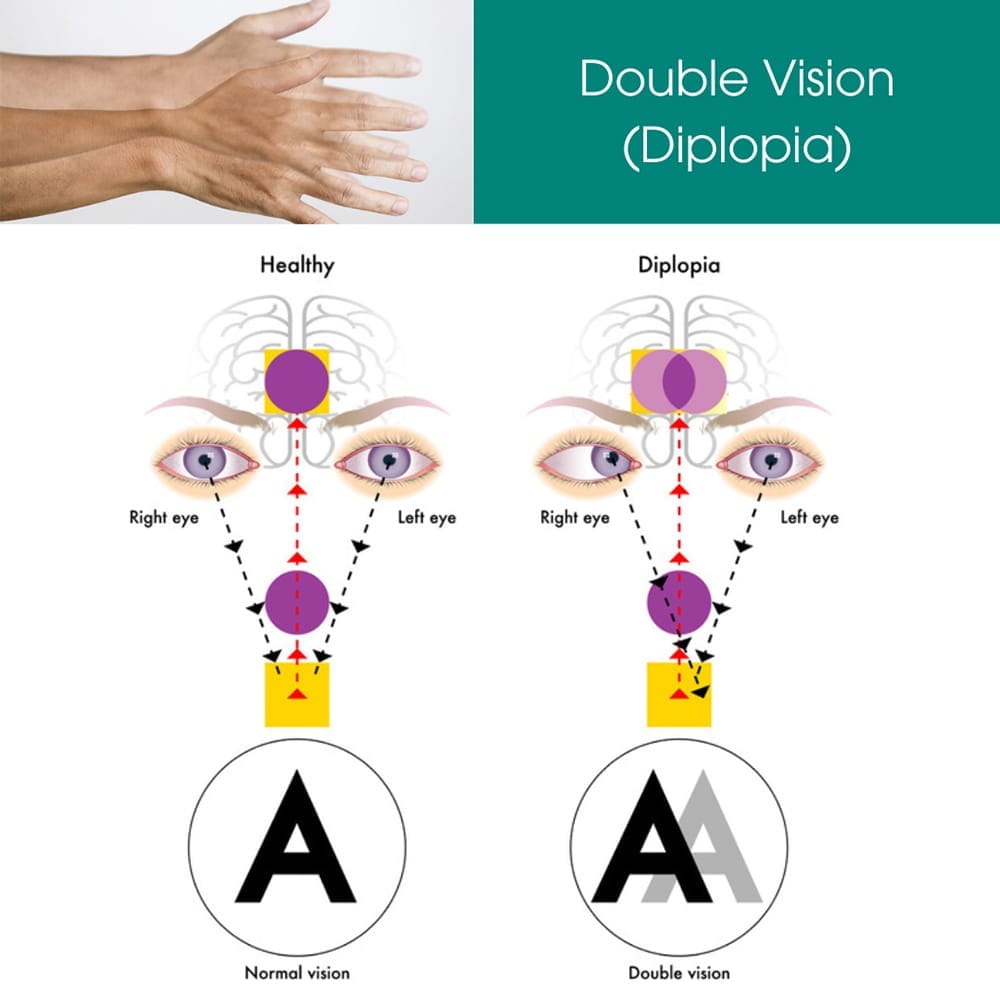 Seeing two images when there should only be one is commonly called double vision. Diplopia is the medical term for seeing double. When you have double vision, you may see two images that are vertical, diagonal or side by side. Diplopia is usually a temporary problem, but in some cases, it’s a sign of a serious underlying issue. It can affect people of all ages but is most common among people over the age of 60.
Seeing two images when there should only be one is commonly called double vision. Diplopia is the medical term for seeing double. When you have double vision, you may see two images that are vertical, diagonal or side by side. Diplopia is usually a temporary problem, but in some cases, it’s a sign of a serious underlying issue. It can affect people of all ages but is most common among people over the age of 60.
Seeing double can be disturbing and it’s one of the most common reasons for emergency room visits. See a reputable and experienced optometrist right away if you have double vision or other signs of eye problems that concern you. For double vision treatment and the best comprehensive eye care in downtown Manhattan, visit Eye Physicians.
Diplopia is divided into two categories, which are monocular diplopia and binocular diplopia. Monocular diplopia is the most common category of diplopia and usually the least serious. It affects just one eye and symptoms continue even when the other eye is covered. Symptoms of binocular diplopia only happen when both eyes are open.
The main symptom of double vision is seeing two images of an object at the same time when you know there should only be one, but there may be other symptoms such as:
Some people with diplopia experience pain when moving their eyes. Double vision can affect depth perception making it difficult to walk or drive, which may cause loss of balance. If you have double vision, you may experience symptoms constantly or your symptoms may come and go. In some people, symptoms develop gradually while in other people, they develop suddenly.
Children with double vision may not know how to explain what’s wrong. See a pediatric eye doctor at Eye Physicians for diplopia treatments in Downtown Manhattan if you notice signs of possible double vision such as covering one eye, squinting or looking at objects from an unusual angle.
Read more: Pterygium Removal
Seeing normally requires your eye muscles, nerves and your brain to all work together. Issues with any of these can lead to double vision.
Causes of monocular double vision usually come from the eye itself, not from any type of neurological problem and include:
Binocular double vision sometimes has more serious causes.
Some of the more serious causes of binocular diplopia include:
Several different medical conditions can affect or damage nerves, including the cranial nerve. These conditions can cause problems with the eyes including double vision.
Examples include:
Monocular diplopia can usually be diagnosed with an eye examination, Link to Eye Exam/Eye Test/Vision Test which involves checking the health of your eyes and patterns of eye movement along with the alignment of your eyes. Your eye doctor asks questions such as whether your symptoms worsen if you change your head position. To diagnose binocular diplopia, your NYC best-in-class ophthalmologist may order an imaging test such as an MRI or CT scan to capture images of the eyes and the area around them.
The team there were very helpful and nice. They took the time to thoroughly examine my eye and the issue I was having with my eyelid. Dr. Hogue was amazing, helpful and took his time explaining any questions I had. I highly recommend him.
ReviewsDr. Hogue was very thorough and explained the tests he was performing. He and his staff were polite and professional. No wait time.
ReviewsI like the facility, it’s very clean and the staff are very friendly! The front desk personnel and the medical assistant is well mannered and nice and Dr. Hogue is very patient and he make sure that I understand everything that he’s telling me!
ReviewsDiplopia treatment requires accurately identifying the underlying cause, since treating double vision depends on what type of double vision you have and what’s causing it.
Some cases of diplopia go away on their own while others require specific diplopia treatments, which may include:
If the lens of the eye has been dislocated because of trauma, surgery may be required to fix it. Eye exercises may improve symptoms of double vision related to convergence insufficiency, a condition that affects how the eyes work together. This condition can start in childhood or may develop after a head injury.
If symptoms of seeing double don’t go away within a few hours after they begin, visit your New York eye doctor as soon as possible. This is especially important if double vision is accompanied by slurred speech, confusion, pain or dizziness.
Don’t delay reaching out to the vision experts at Eye Physicians for accurate diagnosis and treatment of diplopia or other vision changes. While most causes of double vision aren’t dangerous, diplopia that starts suddenly could be caused by a brain tumor or aneurysm and could be life-threatening. For the best eye care in NYC, contact Eye Physicians today.
Eye Physicians
110 Lafayette St, Suite 503
New York, NY 10013
(212) 292-4814
Entrust the care of your precious eyesight to highly skilled and experienced eye care professionals. For top-notch ophthalmologists and optometrists in Downtown Manhattan, choose Eye Physicians. Eye Physicians ensures prompt care, precise diagnosis, and personalized treatment plans.
Schedule an Appointment